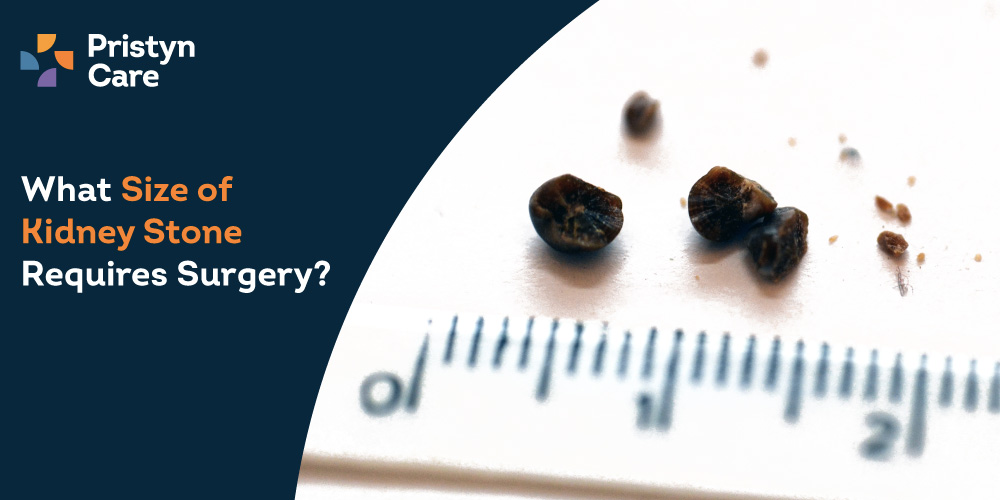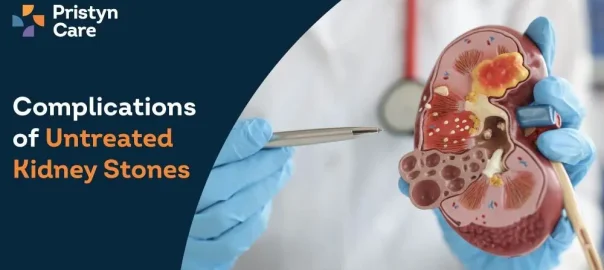![]() Views: 11,528
Views: 11,528
What Size of Kidney Stone Requires Surgery?
The size of a kidney stone is a crucial factor in determining the severity of symptoms and potential complications. Therefore, when diagnosing this condition, doctors meticulously assess the size of the stone. In this blog, we will explore what size of kidney stones require surgery, the difference size makes, the impact that size can have, and the treatment options available based on the size of the stones.
Dedicated Support at Every Step!
Our Doctors are available 24 hours a day, 7 days a week to help you!
Table of Contents
Introduction
No Cost EMI, Hassle-free Insurance Approval
What are Kidney Stones?
Kidney stones or calculi, also known as renal stones or concretions, are hard deposits of minerals and salts that form in the kidneys or other parts of the urinary system. These stones can form due to various reasons, including family history, diet, underlying health conditions, medications, urinary tract blockages, and inadequate hydration. Patients with stones can experience common symptoms such as blood in urine, fever, vomiting, nausea, stomachache, gas, and back pain.
Kidney stones can be classified based on their material composition, such as calcium, uric acid, struvite, or cystine stones. They can have different shapes, including smooth, jagged, or even staghorn-shaped.
These stones can form in the kidney and grow in size, remaining there. If the stones grow in size, they may get stuck in the calyx, at the pelvic ureteric junction (PUJ) or vesicoureteric junction (VUJ), or in the ureter. Some small stones can naturally pass through the ureter and settle in the bladder.
Understanding the Size of Kidney Stones
Kidney stones differ in size. A stone, initially as small as a grain of sand, can grow to the size of a tennis ball. Various factors contribute to the enlargement of kidney stones, including but not limited to excessive salt intake and high body mass index (BMI). The size of the stone significantly influences both the symptoms experienced and the subsequent treatment suggested by the doctor. In fact, when it comes to treating kidney stones, the foremost consideration typically is their size.
Small-sized kidney stones are easy to pass and flush out seamlessly through the ureters. Ureters are the tubes responsible for transporting urine from the kidney to the bladder. These tubes typically possess an internal diameter of 3mm to 4mm. Smaller stones can pass through this passage without causing an obstruction. In fact, patients typically don’t experience any pain or discomfort while passing small-sized kidney stones. However, stones larger than that pose a risk of lodging in the ureters, besides causing other problems. In such circumstances, seeking a doctor’s intervention is important.
What Size of Kidney Stones Require Surgery?
Size Of Kidney Stones | Chances of Passing Naturally | Treatment |
|---|---|---|
Less than 2 mm | 80% | Home remedies |
2 - 4 mm | 80% | Home remedies, medication |
4- 10 mm | 60% | Home remedies, medication, medical procedures (ESWL) Surgery (URSL) |
| Larger than 10 mm | 20% | Surgery (URSL, RIRS, PCNL) |
Surgeries For Kidney stones
As discussed above, the surgery for kidney stones varies depending on its size. The most commonly performed surgeries for kidney stones include:
- Ureteroscopic Lithotripsy or URSL: A commonly performed surgery for extracting kidney stones is Ureteroscopic Lithotripsy (URSL). This method involves the utilization of a long fiber-optic scope called a ureteroscope. The ureteroscope is inserted through the urethra into the ureteral passage, while an x-ray is performed simultaneously to locate the stones. Once the stones are identified, a stone basket is used to collect and remove them from the system. In cases where the stones are too large, a laser may be utilized to break them into smaller pieces, which can be naturally flushed out. Additionally, a stent is inserted to widen the ureteral passage, facilitating the easier passage of stones.
- Percutaneous Nephrolithotomy or PCNL: Another surgical option is Percutaneous Nephrolithotomy (PCNL), which is recommended for stones that are 2 centimeters in size; other techniques prove ineffective. This procedure involves creating a small hole in the flank area to remove the stones. Microforceps may be used to extract the stones, or a laser can be employed to break them down into smaller fragments. Contrast is typically utilized to confirm that no residual pieces remain in the system.
- Retrograde Intrarenal Surgery or RIRS: For larger kidney stones (over 10 mm), surgical interventions are often required. One such procedure is Retrograde Intrarenal Surgery (RIRS), which involves accessing the kidneys through the urethra using a minimally-invasive optic endoscope. The stones are located and then disintegrated using a laser, particularly for large and complex stones.
When Should You See a Doctor for Kidney Stone Surgery
In order to determine the appropriate time to seek medical attention for kidney stone treatment, it is important for patients to be able to identify the different symptoms associated with kidney stones and understand their severity. Recognizing signs that indicate that the kidney stone condition is worsening enables timely intervention and helps prevent complications. It is advisable to make an appointment with a urologist if you experience any of the following symptoms:
- You’re experiencing severe pain along with discomfort.
- You have pain in the flank area or the sides of the lower back.
- You’re frequently feeling nauseous.
- You notice blood in your urine.
- You’re having difficulty passing urine.
- You’re experiencing a strong urge to urinate or have a burning sensation during urination.
Get Treatment For Kidney Stones Of All Sizes At Pristyn Care
Pristyn Care has made quite the mark in India’s surgical landscape and provides top-notch surgical care for kidney stones of different sizes. Our doctors are adept in providing treatment for small, medium, and large kidney stones and chalk out a specialized treatment plan for all patients. They perform a thorough diagnosis to determine the location and size of the kidney stone before suggesting treatment. We have partnered with the best hospitals in the country, which offer state-of-the-art infrastructure and world-class facilities to ensure top-notch patient care. Here are some factors that make Pristyn Care one of the best healthcare facilities for kidney stones treatment in India:
- Urologists with 8+ years of experience
- FREE pick-up and drop facilities on the day of the surgery
- Dedicated care coordinators to assist you throughout the treatment journey
- Multiple payment options, including No-cost EMI
- Complete insurance assistance
- Personalized and compassionate care for patients











